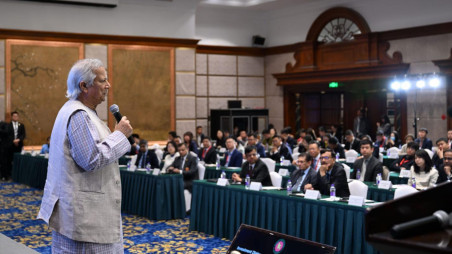
Yunus In China
In a strategic move to bolster Bangladesh’s manufacturing sector and enhance global trade, Chief Adviser Professor Muhammad Yunus has extended a compelling invitation to Chinese investors to establish factories in Bangladesh. Addressing an investment dialogue with Chinese business leaders at The Presidential in Beijing, Yunus highlighted Bangladesh’s burgeoning potential as a manufacturing hub catering to global markets.
Strategic Location and Trade Advantages
Positioned strategically in South Asia, Bangladesh offers unparalleled access to regional and international markets. Yunus emphasized the country’s advantageous location, which facilitates seamless trade across the region and beyond. He noted, “Bangladesh is located in an amazing location which is very potential for regional trade and business.”
Vibrant Manufacturing Sector
As the world’s second-largest ready-made garment (RMG) manufacturer after China, Bangladesh presents significant opportunities for investment in the textile and apparel industry. Yunus pointed out, “Bangladesh is the second largest RMG manufacturer after China.” This sector’s growth offers Chinese manufacturers a strategic platform to expand their global footprint.
Abundant and Dynamic Workforce
Bangladesh boasts a youthful and dynamic workforce, characterized by energy, creativity, and a strong work ethic. Yunus highlighted, “Despite one of the most densely populated nations, Bangladesh has huge youthful manpower with full of energy, creativity and aspiration.” This demographic advantage ensures a steady supply of labor for manufacturing operations.
Enhanced Connectivity and Infrastructure
Recognizing the importance of connectivity, Yunus underscored the need to establish robust trade links with neighboring landlocked countries such as Nepal, Bhutan, and India’s northeastern states. He stated, “We want to create a revolution in the manufacturing sector.” Improving infrastructure and connectivity will facilitate efficient trade routes, benefiting manufacturers and exporters.
Government Incentives and Support
The Bangladeshi government is actively courting foreign investment by offering various incentives, including tax holidays, duty-free import of machinery, and the establishment of special economic zones (SEZs) tailored for foreign investors. These SEZs are designed to provide world-class infrastructure and facilities, streamlining the manufacturing process for global enterprises.
Opportunities Across Sectors
Beyond textiles, Bangladesh offers investment opportunities in sectors such as electronics, pharmaceuticals, automotive components, and renewable energy. The government’s focus on diversifying the industrial base presents Chinese businesses with a broad spectrum of options for investment and collaboration.
Strengthening Bilateral Relations
Yunus’s appeal aligns with ongoing efforts to deepen economic ties between Bangladesh and China. During his recent visit to China, discussions centered on facilitating the relocation of Chinese manufacturing industries to Bangladesh, including sectors like ready-made garments, electric vehicles, light machinery, high-tech electronics, chip manufacturing, and the solar panel industry.
Mutual Benefits and Global Reach
Establishing manufacturing units in Bangladesh offers Chinese companies several advantages:
-
Cost Efficiency: Lower labor and operational costs can enhance profit margins.
-
Market Access: Proximity to emerging markets in South Asia and beyond facilitates efficient distribution.
-
Trade Preferences: Benefit from trade agreements and duty-free access to various markets.
For Bangladesh, this initiative promises job creation, technological advancement, and increased export revenues, contributing to sustainable economic growth.
Call to Action
Chief Adviser Yunus concluded his address by reiterating the vast potential for collaboration, stating, “You can tap the advantage of business in Bangladesh.” He extended a warm invitation to Chinese investors to explore the myriad opportunities available, aiming to transform Bangladesh into a global manufacturing hub that benefits both nations and the international community.
This strategic initiative marks a pivotal step toward strengthening economic ties and fostering mutual growth, positioning Bangladesh as a key player in global manufacturing and trade networks.
